Sometimes in the past it seemed that bikes would get updates for the sake of it. A perfectly good machine would get a new engine, revised chassis, flash swooping bodywork and expensive tech, yet end up not being much better than the old ‘un.
That doesn’t seem to happen so much now, thankfully. And Honda has resisted the temptation with its ‘Rebel’ range of gentle street cruisers, the CMX500 and CMX1100 Rebels.
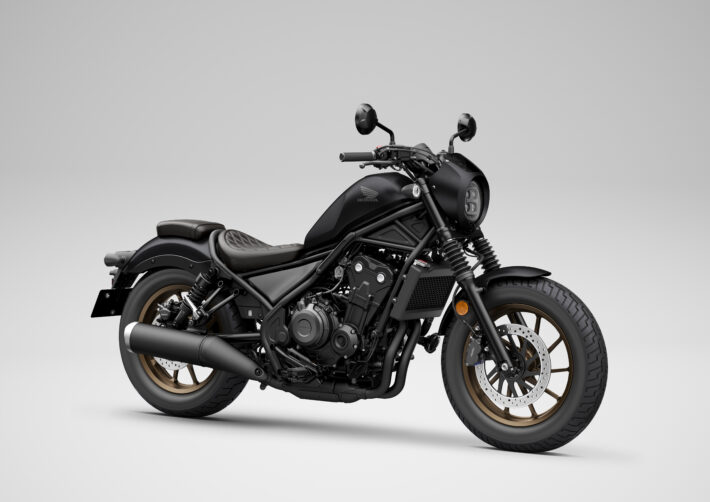
The 500 was first launched in 2017 and became a bit of a surprise hit, selling by the container-load all across Europe. Its combination of novice-friendly A2-compliant performance, smart looks, decent tech and solid value tapped into some hidden demand, and Honda made out like gangbusters.
Indeed, Kawasaki ended up building essentially the same bike with its 2024 Eliminator 500 to try and get in on the action…
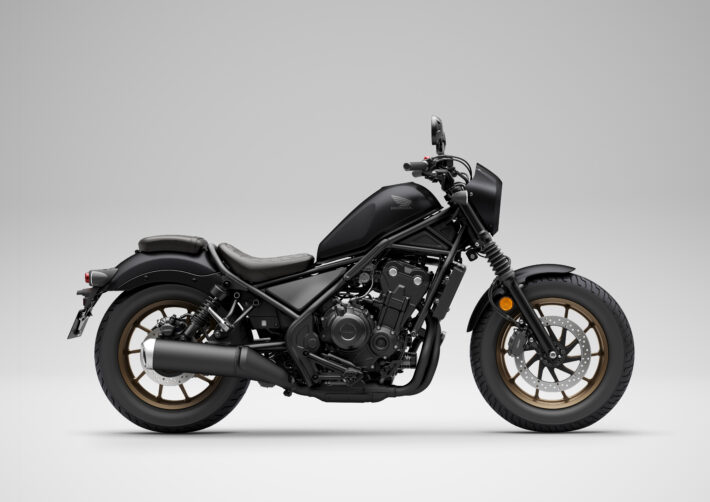
Honda came out with an 1100 version in 2021 with the aim of extending that success into a big-bore machine, and it did well, albeit without the roaring success of the 500.
Arguably, in the 1000cc+ sector, people are willing to pay a bit extra for ‘the real thing’ in terms of cruisers, opting for a Harley-Davidson, Indian or maybe a Triumph Bobber or Rocket 3. But the Africa Twin-engined CMX1100 has opened up its own furrow with smooth, easy performance and optional high-tech kit like Honda’s unique DCT auto transmission.
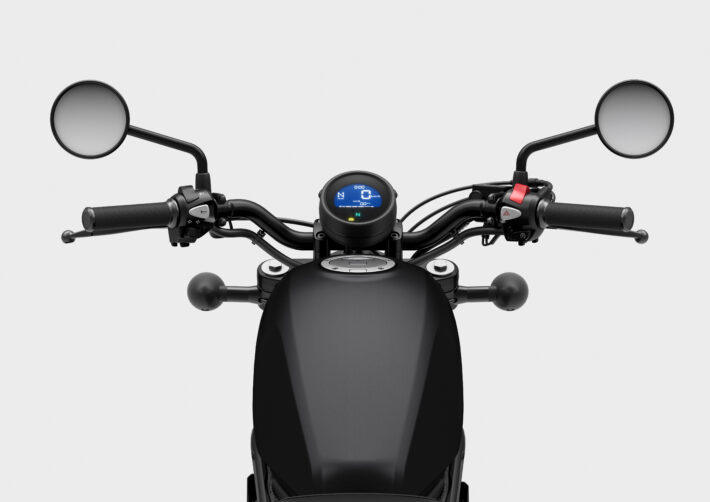
Both 500 and 1100 have been big hits for Honda though, showing the original design got it just about right.
For 2025 then both 500 and 1100 Rebels are getting some updates – but nothing too involved. Starting with the smaller sibling, the 2025 CMX500 Rebel sees detail mods to the engine, mostly on the exhaust and inlet side, to add Euro 5+ homologation.
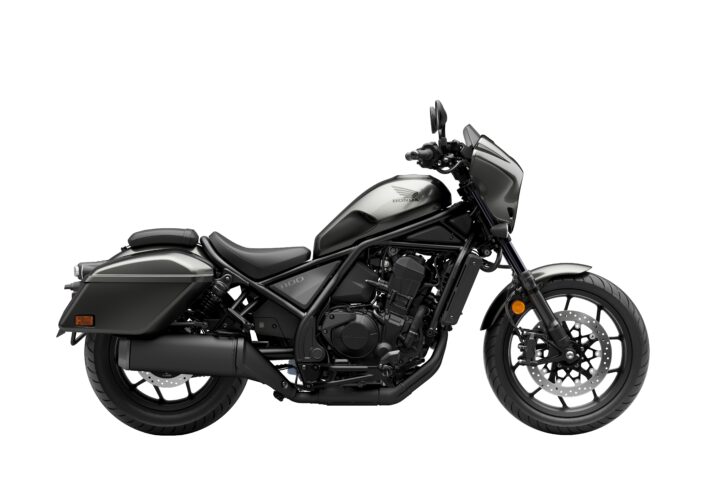
The exhaust, with its 120mm diameter ‘shotgun’ style silencer, gets a new OBD2-2 gas sensor, which works with a revised ECU and new linear air flow intake sensor for even cleaner ‘mouse-fart’ style exhaust emissions.
The 471cc eight-valve DOHC parallel twin still makes the same power: 34kW or 46bhp@8,500rpm and 43.3Nm of torque at 6,000rpm, and lives in the same steel tube frame setup. The riding position has been tweaked with new footpeg and handlebar positions, and the seat has a new foam material for extra comfort on long runs.
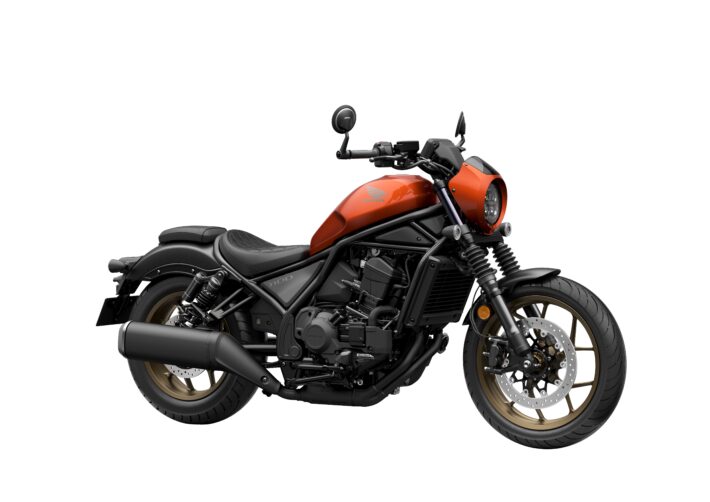
More interestingly, it now has a simpler pillion pad and footpeg fitment, easily swapped out for rider-only use. Finally, Honda has expanded the range of custom accessories, including front fork gaiters, tank pads, different seat fitments, passenger backrest, luggage, heated grips and more.
The CMX1100 Rebel gets a bigger overhaul, with three models now available in a new Rebel range: the CMX1100, the T touring version with small fairing and neat hard panniers fitted, and an SE special edition with extra kit already bolted on from the factory.
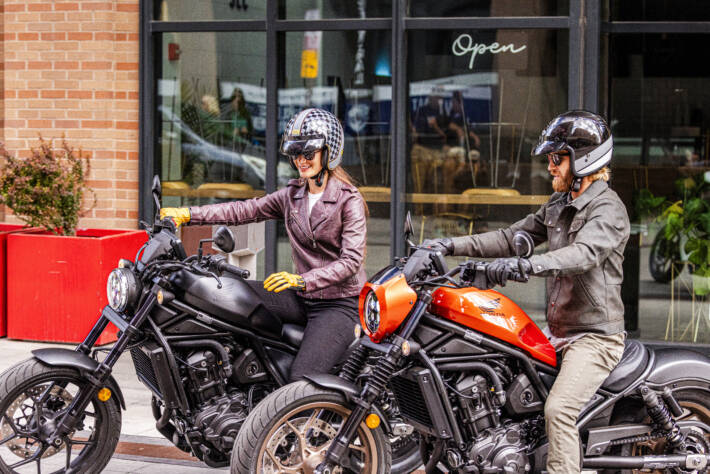
The 1100 engine has been updated with some more mods from the latest Africa Twin models (which shares the basic motor layout): higher compression, altered valve timing, a heavier flywheel and retuned exhaust system. Honda says these tweaks give the 1,084cc SOHC 8-valve 270° parallel twin a boost in low- and mid-range torque with no loss of peak power.
The bore remains 92mm with 81.5mm stroke; compression ratio is now 10.5:1 (from 10.1:1) and the engine now produces 87bhp@7,250rpm, up about 1bhp, but Honda says there’s much more torque available. While the peak torque output stays the same – 98Nm@4,750rpm – response is much stronger, from the bottom of the rev range up, there’s 32% more than the Africa Twin engine.
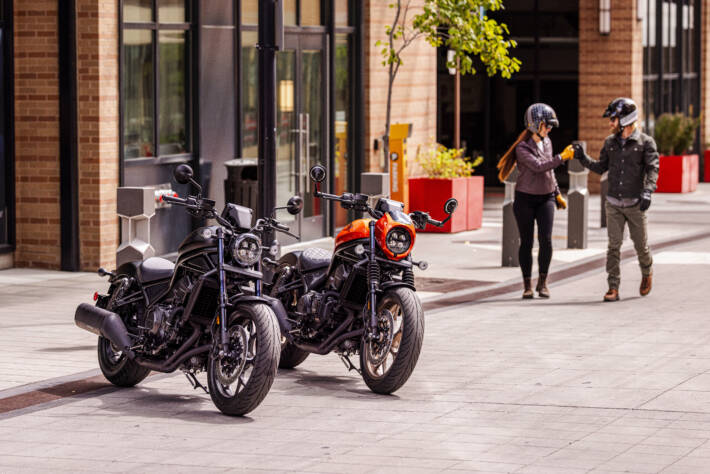
And Honda says its engineers have further tailored the engine characteristics to the CMX1100 Rebel through the use of a model-specific camshaft and flywheel, to help emphasise the natural pulses of the engine. The motor also gets the necessary ECU and sensor updates to comply with Euro 5+ homologation, and there’s now ride-by-wire throttle control.
That means improved rider aids: better traction control and four riding modes including one customisable User mode.
Honda’s also refined the DCT setup on the Rebel, with claimed smoother starting-off and low-speed control, ideal for U-turns and the like. It’s also better matched to the throttle control thanks to the ride-by-wire system.
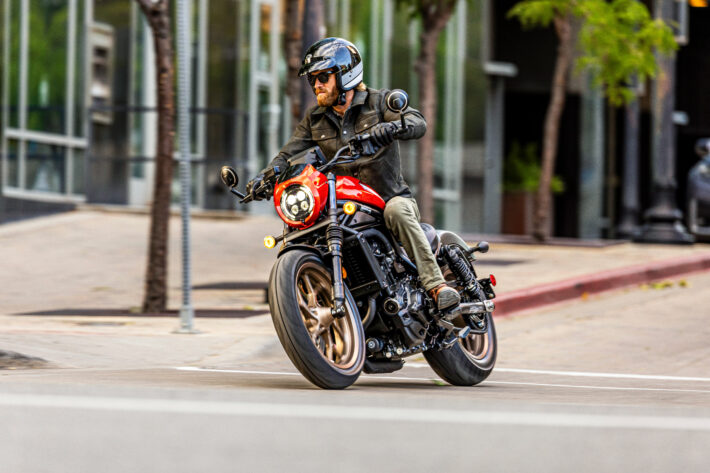
Away from the engine, Honda’s revised the riding position; the handlebars move 28mm rearward toward the rider, and up 12mm with the footpegs also moving 50mm forward. In conjunction the seat – constructed with a new high-grade urethane foam – is 10mm thicker and slightly wider without impacting ground reach (seat height is a very manageable 710mm, up from 700mm). All these changes apparently combine to make the riding position roomier and more relaxed.
Cruisers have seldom cared about their mass, and the Rebel is a chunky lad on the quiet. Kerb weight is set at 226kg with manual transmission, and 236kg for the DCT-equipped option, while the touring CMX1100T weighs in at 240kg as a manual and 250kg in DCT form, and the special edition CMX1100SE Rebel is 237kg.
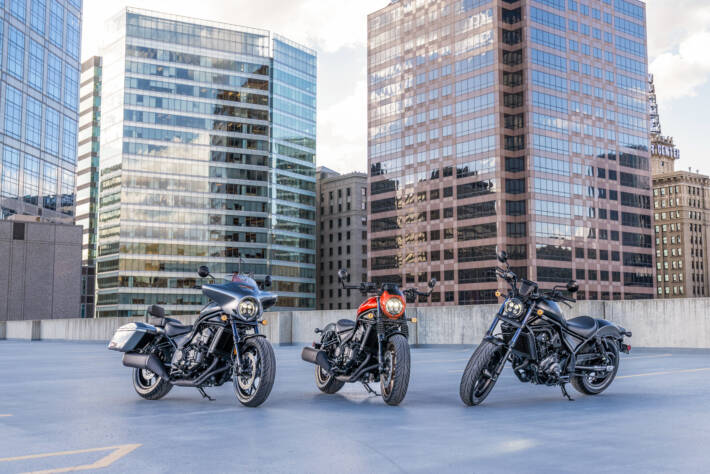
There are plenty of other upgrades, with a new 5” LCD full colour TFT dashboard albeit a square one rather than the round design some other custom designs insist upon. It’s an optically-bonded design to improve visibility in bright sunlight: sealing the gap between the cover glass and TFT screen with resin means glare is reduced, and backlight transmittance improved.
It’s customisable between Bar, Circle and Simple display patterns and offers the IOS/Android smartphone connectivity of Honda RoadSync. This feature – alongside a simplified, easy-to-use, backlit 4-way toggle-switch on the left handlebar – allows straightforward, on-screen turn-by-turn navigation as well as the option (via a Bluetooth helmet headset) to make calls or listen to music using Honda RoadSync with an app on your smartphone.
Relocated from under the seat, the USB-C charging port is now sited on the left side of the display for convenience and ease of connection.
As before, the Rebel rider can go solo or carry a passenger (the rear seat pad quickly and easily unbolts) and under the seat there’s a handy 3L storage compartment. The ignition key locates on the left side of the frame and opens the seat without having to be removed from the ignition. For long highway days, cruise control is also fitted as standard.
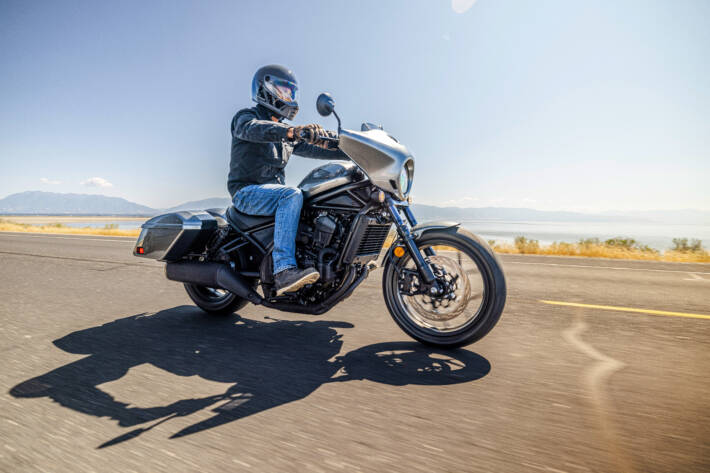
Honda UK is only bringing in three versions, presumably based on what it knows will sell in old Blighty. British riders can choose from the CMX1100 manual transmission, the CMX1100 Tour with DCT or the CMX1100 Tour SE also with DCT. However, you can go crazy with official accessories: here’s a list of the optional packs available for the new CMX1100 from the dealer:
Style Pack designed to highlight the custom appearance of the Rebel, by adding:
- Short Front Fender
- Headlight Cowl (extended Windshield for CMX1100T variant)
- Wheel Stripes
- Side Tank Pads
- Tank Pad Center
(Following items only included in Style Pack for CMX1100 variant)
- Bar End Mirrors
- Radiator Side Covers
- Front Fork Boot
Comfort Pack (available in Black or Brown) a versatile collection of parts designed to enhance both rider and pillion’s comfort and convenience:
- Rear Carrier
- Passenger Backrest
- Heated Grips
The Travel Pack (available in Black or Brown colours) is a collection of accessories which turn the Rebel into a long-distance tourer and travel companion:
- Comfort Rider Seat
- Comfort Pillion Seat
- Right Saddle Bag & Support
- Left Saddle Bag & Support
The following accessories are also available:
- Solo Carrier
- Screen Cowl
- Rider Seat (diamond padding brown / black)
- Brown Passenger Seat
We’ve no exact word as yet from Honda on the pricing or availability of the new Rebels – but the firm will announce this at the NEC Motorcycle Live show next month. More as we get it, in the meantime there will be more info at www.honda.co.uk
CMX500 Rebel Specifications
| ENGINE | |
| Type | Liquid-cooled 4-stroke, 4 valve DOHC parallel twin, 471cc |
| Bore x Stroke (mm) | 67 mm x 66.8 mm |
| Compression Ratio | 10.7:1 |
| Max. Power Output | 34 kW at 8,500 rpm |
| Max. Torque | 43.3 Nm at 6,000 rpm |
| Max Speed | 153km/h |
| Oil Capacity | 3.2 L |
| FUEL SYSTEM | |
| Carburation | PGM-FI |
| Fuel Tank Capacity | 11.2 L |
| CO2 Emissions WMTC | 84 g/km |
| Fuel Consumption | 3.6 L/100km |
| ELECTRICAL SYSTEM | |
| Battery Type | AGM |
| Battery Capacity | 12 V 7.4 Ah |
| DRIVETRAIN | |
| Clutch Type | Wet multiplate, assist and slipper clutch |
| Transmission Type | 6-speed |
| Final Drive | Chain |
| FRAME | |
| Type | Diamond steel |
| CHASSIS | |
| Dimensions (L´W´H) | 2,205 mm x 810 mm x 1,090 mm |
| Wheelbase | 1,490 mm |
| Caster Angle | 28° |
| Trail | 110 mm |
| Seat Height | 690 mm |
| Ground Clearance | 125 mm |
| Kerb Weight* | 191 kg (Special Edition – 192kg) |
| Turning radius | 2.8 m |
| SUSPENSION | |
| Suspension Front | 41 mm telescopic forks: 121 mm travel |
| Suspension Rear | Showa twin shock: 95 mm travel |
| WHEELS | |
| Wheels Front | 16M/C x MT3.00 |
| Wheels Rear | 16M/C x MT3.50 |
| Tyres Front | 130/90-16M/C (67H) |
| Tyres Rear | 150/80-16M/C (71H) |
| BRAKES | |
| ABS Type | Two-channel |
| Brakes Front | Single 296 mm discs with Nissin axial-mount two piston calipers |
| Brakes Rear | Single 240 mm disc with single piston caliper |
| INSTRUMENTS & ELECTRICS | |
| Instruments | LCD Meter with Speedometer, clock, gear position |
| Headlight | LED |
| Taillight | LED |
| Security System | HISS |
CMX1100 Rebel specifications
| CMX1100 | CMX1100 DCT | CMX1100T | CMX1100T DCT | CMX1100SE DCT | |
| ENGINE | |||||
| Type | Liquid-cooled 4-Stroke 8-Valve Parallel Twin with 270° crank and Unicam, 1,084cc | ||||
| Bore x Stroke (mm) | 92 mm x 81.5 mm | ||||
| Compression Ratio | 10.5:1 | ||||
| Max. Power Output | 65 kW at 7,250 rpm | ||||
| Max. Torque | 98 Nm at 4,750 rpm | ||||
| Max Speed | 160 km/h | ||||
| FUEL SYSTEM | |||||
| Carburation | PGM-FI Fuel Injection | ||||
| Fuel Tank Capacity | 13.6 L | ||||
| CO2 Emissions WMTC | 114 g/km | 123 g/km | 114 g/km | 123 g/km | 123 g/km |
| Fuel Consumption | 4.9 L/100km | 5.3 L/100km | 4.9 L/100km | 5.3 L/100km | 5.3 L/100km |
| ELECTRICAL SYSTEM | |||||
| Battery Type | AGM | ||||
| Battery Capacity | 12 V 11.2 Ah | ||||
| DRIVETRAIN | |||||
| Clutch Type | Wet Multiplate Clutch | 2x Wet Multiplate Clutch | Wet Multiplate Clutch | 2x Wet Multiplate Clutch | 2x Wet Multiplate Clutch |
| Transmission Type | 6-speed Manual | 6-speed Dual Clutch | 6-speed Manual | 6-speed Dual Clutch | 6-speed Dual Clutch |
| Drive | Chain | ||||
| FRAME | |||||
| Type | Steel diamond | ||||
| CHASSIS | |||||
| Dimensions (L´W´H) – mm | 2,240 x 850 x 1,125 | 2,240 x 835 x 1,125 | 2,240 x 850 x 1,180 | 2,240 x 845 x 1,180 | 2,240 x 880 x 1,125 |
| Wheelbase | 1520 mm | ||||
| Caster Angle | 28° | ||||
| Fork Angle | 30° | ||||
| Trail | 110 mm | ||||
| Seat Height | 710 mm | ||||
| Ground Clearance | 120 mm | ||||
| Kerb Weight | 226 kg | 236 kg | 240 kg | 250 kg | 237 kg |
| Turning radius | 2.9 m | ||||
| SUSPENSION | |||||
| Front | Preload adjustable 43mm cartridge style | ||||
| Rear | Preload adjustable twin piggyback rear shock | ||||
| WHEELS | |||||
| Wheels Front | 18M/C X MT3.50 Multi-spoke cast aluminium | ||||
| Wheels Rear | 16M/C X MT5.00 Multi-spoke cast aluminium | ||||
| Tyres Front | 130/70B18 M/C 63H | ||||
| Tyres Rear | 180/65B16 M/C 81H | ||||
| BRAKES | |||||
| ABS Type | Dual-channel ABS | ||||
| Front | Radial mounted monoblock four-piston brake caliper, 330mm floating single disc | ||||
| Rear | Single piston caliper, 256mm single disc | ||||
| INSTRUMENTS & ELECTRICS | |||||
| Instruments | Five-inch TFT Screen | ||||
| Headlight | LED | ||||
| Taillight | LED | ||||
| Connectivity | Roadsync | ||||
| USB | USB-C | ||||
| Security System | HISS | ||||
| Cruise Control | Yes | ||||
| Riding mode | Standard, Sport, Rain, User 1 and User 2 | ||||
| HSTC | 3 Level + OFF | ||||